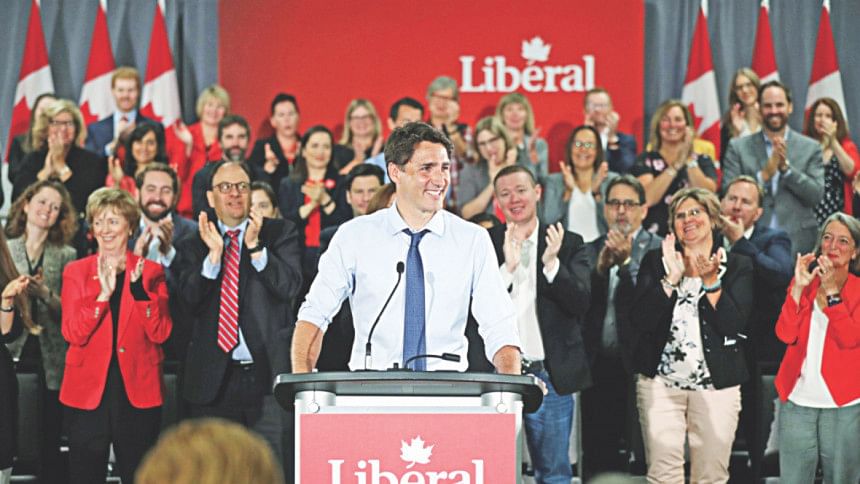Why is Trudeau taking Canada to the polls?

In a bid to secure a parliamentary majority and strengthen his position as Canada's principal political architect, a confident Justin Trudeau is taking his country to the voting stations on September 20 this year. On August 15, Trudeau met with Governor General Mary Simon—the representative of Canada's Head of State Queen Elizabeth II—and advised her to dissolve parliament. This commenced a month-long period of election campaigning amidst what health experts are terming a fourth wave—with an increasing prevalence of the Delta variant. One may ask—why now? The answer is pretty simple: timing.
The scheduling of the elections is pitch-perfect for Trudeau to attain the consent of his electorate to govern and to acquire the elusive parliamentary majority that he is enthusiastically looking to get—the Canadian Broadcasting Corporation (CBC) predicts Trudeau's party to attain roughly 35 percent of the national vote, followed by the Conservative Party trailing at 29 percent. The centre-left Liberals have been leading the country in a minority government for the past couple of years—meaning Trudeau's legislative schemas are often based on his party's cooperation with other actors, such as the left-leaning New Democratic Party (NDP). Following the 2019 elections, Trudeau lost significant footing in parliament—with 33.12 percent of total votes, the Liberals had formed a single-party minority government with the lowest vote share for any party in power in Canadian history. In fact, they lost the popular vote, meaning more Canadians voted in favour of a Conservative government and for ousting Trudeau from office.
Nevertheless, Canada's electoral system dictated otherwise—the candidate with most votes in an electoral riding wins a seat in the House of Commons or the Canadian Parliament, representing that riding as its MP. Essentially, the Liberals had more elected MPs in parliament, even though the total votes cast for the party were lower than that for their primary opponents, the Conservatives. In a nutshell, Trudeau today is looking towards voters for an unambiguous and definitive mandate to govern—something which his party had from 2015 to 2019.
During the 2015 electoral campaign, Trudeau was marketed by his party as Prince Charming in a suit. Dashing, youthful, and apparent heir to his father Pierre Trudeau's legacy, Justin Trudeau was deemed by the international media as the poster boy for Western liberalism. Fast forward six years, he is anything but that. As of August 2021, the Angus Reid Institute puts Trudeau's approval rating at 38 percent. To put this into context, he had an approval rating of 65 percent and a disapproval rating of 30 percent in September 2016, at the height of his popularity. Even though his personal reputation has receded over the years, it is safe to say that while he may not be a likeable prime ministerial candidate, the Liberal leader continues having a discontent yet agreeable electorate backing him.
Trudeau has made no secret of his ambitions for a bigger and bolder role for the federal government. His regime has taken a much broader systematic approach towards consolidating policy programmes that have traditionally been under the purview of provincial or regional governments—in many ways contradicting Canada's decentralised system of governance, termed "federalism". In fairness, this was an acknowledgement of the need for immediate responses to counter the socio-political implications of the pandemic. However, Trudeau's increasingly authoritarian tendencies (as his opponents put it) have been widely criticised in regions where his party's political influence remains fragile—oil-rich Alberta and francophonic Quebec continue acting as his primary Achilles' heel. As expected, the pandemic recovery plan moved beyond the realms of traditional policymaking and included a Liberal agenda, which saw large-scale investments in social safety nets—stimulus packages in the form of CAD 2000 monthly Canadian Emergency Response Benefit (CERB) payments to the population were, to Trudeau's credit, widely applauded across the country. The long-term implications on the Canadian balance sheet are, however, a cause for concern. It took the country over 150 years since its inception to amass a national debt of USD 721.4 billion, and one year after the pandemic, that debt burden grew by a staggering 66 percent.
While the federal government's mass vaccination campaign and procurement strategy have been hotly debated, it is Trudeau's prerogative to claim that he has managed enough vaccines for each and every individual in Canada. More than 71 percent of eligible Canadians are fully vaccinated, with over 82 percent receiving at least one dose. An extended lockdown in varying forms over the past year and a half, which stifled small businesses and decelerated economic activity, has finally been lifted across all parts of the country. Even though provincial governments had the final say in deciding mobility restrictions, the message from the top has been to vaccinate first and open up later. Therefore, the government's handling of the pandemic has been deemed a relative success by observers, giving Trudeau the chance to seek a stronger mandate from voters.
"Canadians need to choose how we finish the fight against Covid-19," was the central message provided by the PM when asked why he was taking his nation to the polls within such a short period of time. It is true to an extent that Trudeau's promises are in many ways radical. His government propped up environmental policy plans by aiming to eliminate all combustible engine-run cars and light trucks by 2035. He wants to carry home the call for a tobacco-free Canada, also by 2035. These programmes are, in fairness, not in sync with the kind of political programmes that the opposition, particularly the Conservative Party, have been constructing in the past decade. Therefore, it is safe to say that Trudeau has a convincing argument in calling for early elections. The people have witnessed the political philosophy of the Liberals. Therefore, voters should have the opportunity of providing their consent, or lack thereof, for the direction Canada will take in the post-pandemic world.
The story does not end there. Trudeau's tenure has witnessed his previous pick for Governor-General, Julie Payette, put the Canadian government at the heart of a workplace harassment scandal. Accusations of sexual abuse against the military leadership were sidelined by the PM's Office. As a result, Trudeau faced heat from local media. He was obliged to oversee a period where Canada was put to shame over the discovery of mass graves of indigenous people across the country—increasing existing tensions regarding land rights, water access, and the very idea of reconciliation between indigenous groups and government agencies. Internationally, Canada's diplomatic ties with China, USA and Saudi Arabia have faced a myriad of economic and political challenges. Therefore, to suggest that all is well for Trudeau would be inaccurate. His insistence on tapping into a federal carbon pricing policy—in line with his macroeconomic aim to reduce greenhouse gas emissions by 30 percent by 2030, and to achieve net-zero emissions by 2050—is not popular amongst many of voters whose support he desperately needs in order to attain his prized majority.
Nevertheless, Trudeau has achieved a stoic reputation of investing towards realistic state-led interventions to support the Canadian middle class. The establishment of a national childcare plan, with the aim of decreasing costs for parents down to CAD 10/day per child within five years, forms a key segment of his electoral manifesto. Resonating with new immigrants, people of colour and traditional Liberal voters, such programmes continue making Trudeau Canada's strongest candidate for the post of prime minister. His primary challenge will be to ensure that these voters are not swayed towards the rising NDP. The fundamental argument is that Liberals will push for stability—and stability in uncertain times is, without a doubt, a lucrative option for voters.
Mir Aftabuddin Ahmed is a Toronto-based banking professional. Email: [email protected]

 For all latest news, follow The Daily Star's Google News channel.
For all latest news, follow The Daily Star's Google News channel. 



Comments